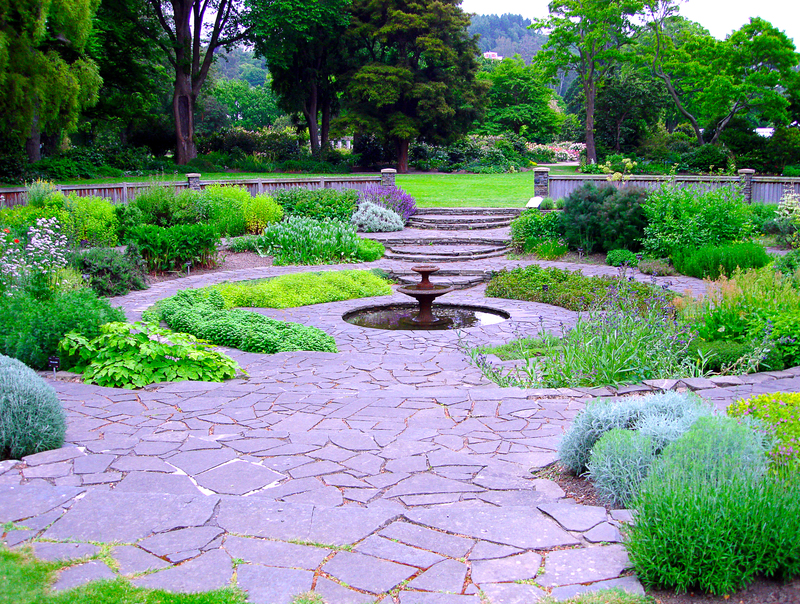Discover Zen Garden Designs to Cultivate Peace and Tranquility Outdoors
Posted on 19/09/2025
Discover Zen Garden Designs to Cultivate Peace and Tranquility Outdoors
Step into a realm of serenity. Explore the art of Zen garden designs that foster tranquility and peace in your outdoor spaces.
Introduction to Zen Garden Concepts
Zen gardens, also known as Japanese rock gardens or karesansui, are thoughtfully designed landscapes centered around minimalism, symbolism, and mindfulness. These gardens originated in Japan, where Buddhist monks cultivated them to promote meditation and inner harmony. Today, Zen-inspired gardens are celebrated around the world for their ability to transform outdoor areas into peaceful sanctuaries.

The Essence of Tranquility: What Is a Zen Garden?
A Zen garden is more than just an outdoor decoration; it is a living work of art. Characterized by simple, often monochromatic elements such as rocks, sand, and gravel, these gardens embody the principles of Zen Buddhism--simplicity, austerity, naturalness, and subtlety. The goal is to evoke peace and tranquility outdoors, creating a calming environment for contemplation and relaxation.
- Minimalist beauty: Less is more in Zen garden design.
- Symbolism: Every element carries meaning, representing nature's landscapes, such as rivers or mountains.
- Focus on mindfulness: Arranging and maintaining a Zen garden can become a meditative practice.
Principles of Zen Garden Designs
To create a true Zen-inspired outdoor space, certain principles must be followed. These guidelines help ensure that your garden radiates the essential qualities of calm and peace.
Simplicity and Minimalism
Zen garden designs strip away the extraneous, focusing only on what is essential. The use of a limited color palette and a careful arrangement of elements helps foster a sense of order and stillness.
Natural Elements
Stones, sand, gravel, and select plants dominate the landscape, symbolizing the mountains, islands, rivers, and seas. Traditionally, sand or gravel is raked to mimic the rippling surface of water, guiding the viewer's thoughts toward contemplation.
Asymmetry and Balance
Unlike Western-style gardens, where symmetry is often celebrated, Zen garden designs utilize asymmetry to mimic the randomness found in nature, reflecting balance through thoughtful composition rather than mirrored halves.
Enclosure and Intimacy
Physical and psychological boundaries--such as fences, hedges, or strategically placed rocks--create a sanctuary feel and heighten the sense of "stepping apart" from the world, amplifying outdoor peace and tranquility.
Symbolic Representation
Often, major natural features are represented in miniature--rocks stand for mountains, raked gravel simulates flowing water, and sparse plantings hint at forests or islands. This symbolism is central to Zen garden philosophies.
Popular Styles of Zen Garden Designs
Depending on your preferences and available space, different variations of Zen garden layouts can help achieve your desired peaceful atmosphere:
1. Karesansui (Dry Landscape Gardens)
- Features: Arrangements of rocks, gravel or sand, and minimal vegetation.
- Purpose: To evoke impressions of mountains, rivers, or islands.
- Benefits: Low maintenance, suitable for small to medium spaces.
2. Moss Gardens
- Features: Carpeting of moss, with scattered stones and understated water elements.
- Purpose: Adds lush, verdant tranquility, ideal for shady areas.
- Benefits: Retains moisture, attracts birds and small wildlife.
3. Courtyard Zen Gardens
- Features: Compact size, placing Zen elements within urban or small residential courtyards.
- Purpose: Adapts classic Zen features to modern urban living.
- Benefits: Fits limited spaces, creates private nooks for relaxation.
4. Stroll Gardens (Kaiyu-shiki-teien)
- Features: Paths winding through scenic arrangements of rocks, water, and plants.
- Purpose: Encourages mindful walking and exploration.
- Benefits: Suitable for larger properties, integrates movement into tranquility.
Essential Elements for Zen Garden Designs
Thoughtful Zen garden arrangement depends on the careful selection and placement of the following elements:
Rocks and Stones
Rocks are the backbone of a traditional Japanese Zen garden. Whether tall and jagged or smooth and rounded, their placement is deliberate. They symbolize stability, permanence, and the enduring qualities of nature.
Sand and Gravel
Fine gravel or sand acts as a symbolic representation of water, ocean waves, or flowing streams. Raked into flowing patterns, these "seas" of sand bring a sense of order and create focal points for meditation.
Plants and Greenery
While many Zen-inspired garden layouts use plants sparingly, delicate mosses, dwarf conifers, ferns, bamboo, and ornamental grasses can lend softness and depth while maintaining minimalism.
Water Features
Water is a powerful symbol, representing purity and life. Even in dry gardens, water may be suggested through the arrangement of raked gravel. In larger Zen gardens, koi ponds, streams, or simple stone basins add both movement and sound to enhance tranquility.
Paths and Stepping Stones
Stone or gravel paths guide movement and link key elements, encouraging slow, mindful travel through the space. They also provide structure and subtly shape the garden's flow.
Lanterns and Garden Structures
Traditional stone lanterns, bamboo fences, and simple wooden benches offer accent points and enhance the authenticity of your peace-centered outdoor design.
How to Design Your Own Outdoor Zen Garden
Ready to cultivate peace and tranquility in your backyard? Follow these steps for DIY Zen garden creation:
- Choose the right location: Select a quiet, secluded area if possible. Partial shade is preferable, but Zen gardens adapt well to both sun and shade.
- Clear and prepare the ground: Remove grass, weeds, and debris. Level the soil, and lay a landscape barrier if desired to prevent weed growth.
- Define boundaries: Use natural stone edging, bamboo fencing, or even simple wooden frames to create a sense of enclosure and focus.
- Arrange large stones: Place the largest rocks first, grouping them in odd numbers and varying their shapes and heights for a balanced composition.
- Spread sand or gravel: Distribute an even layer, then use a rake to create linear or swirling patterns--these mimic the gentle movement of water.
- Add plants thoughtfully: Place low-maintenance greenery, like moss or small shrubs, near rocks and in shaded sections. Keep plantings sparse and intentional.
- Incorporate water features or lanterns: A small water basin, fountain, or decorative lantern can provide a beautiful focal point and soothing ambiance.
- Create a path: Use stepping stones, flat rocks, or gravel to form a simple path for walking meditation and access.
- Personalize with accents: Sculptures, prayer wheels, or a simple wooden bench provide inviting spots for reflection.
Tips for Maintaining Zen Tranquility Outdoors
Upkeep is an integral part of Zen gardening. Routine care not only preserves aesthetic beauty but also deepens your connection to the garden:
- Regularly rake sand or gravel: Maintain clean lines and patterns for a polished look and meditative effect.
- Weed frequently: Keep the space immaculate and clutter-free.
- Trim plants sparingly: Prune as needed, focusing on natural shapes and minimalism.
- Clean structures and lanterns: Remove debris periodically for a fresh appearance.
- Take time to reflect: Use moments of maintenance as opportunities for mindfulness, reinforcing outdoor peace and calm.
Benefits of Zen-Inspired Outdoor Spaces
Incorporating Zen garden designs into your exterior environment offers more than curb appeal. Their advantages also touch mental and emotional well-being:
- Stress reduction: The act of both creating and enjoying a Zen garden can lower stress and promote relaxation.
- Mindfulness and meditation: Outdoors spaces arranged for tranquility support daily mindfulness practices and quiet reflection.
- Creativity and inspiration: Being immersed in simple, beautiful surroundings fosters creativity and mental clarity.
- Low maintenance: Unlike traditional gardens, Zen spaces require less effort and fewer resources to keep stunning year-round.
- Environmental harmony: Sustainable materials and natural elements promote biodiversity and ecological balance.
- Property value: A well-designed Zen garden can boost the attractiveness and value of your home.
Zen Garden Design Trends for Modern Living
The versatility of Zen garden styles makes them well-suited for contemporary outdoor living. Explore these current trends as you plan your tranquil sanctuary:
Urban Zen Courtyards
Transform even the smallest patio or balcony into a peaceful escape with compact sandboxes, potted bamboos, and simple pebble arrangements.
Mixed Materials
Combine traditional gravel and stone with modern concrete features, glass, or metal for a unique twist that maintains serenity while adding visual interest.
Sustainable Elements
Utilize recycled materials, drought-tolerant plantings, or solar-powered lanterns for eco-friendly outdoor tranquility.
Interactive Features
Introduce movable elements--such as mini-rake kits or modular sandboxes--for hands-on mindful play, perfect for families or educational settings.
Indoor Zen Gardens
When outdoor space is at a premium, bring Zen principles indoors with tabletop or window gardens, featuring pebbles, moss, and small sand trays for moments of calm at home or work.

Inspiration: Famous Zen Gardens Around the World
To ignite your creativity, study the celebrated Japanese Zen gardens that have inspired peace for centuries:
- Ryoan-ji Temple (Kyoto, Japan): Renowned for its austere rock arrangements and raked gravel, this World Heritage Site exemplifies minimalism and profound tranquility.
- Kennin-ji Temple (Kyoto, Japan): The oldest Zen temple in Kyoto, featuring a mesmerizing dry landscape and sweeping sand waves.
- Adachi Museum of Art (Shimane, Japan): Famed for its harmonious blend of traditional and modern garden design.
- Portland Japanese Garden (Oregon, USA): An authentic recreation of multiple Japanese garden styles, showcasing the adaptability of Zen design principles around the globe.
Begin Your Journey to Outdoor Peace and Tranquility
Whether you seek a meditative corner or a full backyard retreat, Zen garden designs offer a pathway to peace in any outdoor area. Reflect on your space, embrace the elegant simplicity of Zen, and embark on the rewarding journey of cultivating your own oasis--where every stone and grain of sand whispers calm, and every step brings you closer to tranquility.
Key Takeaways:
- Zen gardens are accessible and adaptable to all outdoor spaces, from tiny balconies to sprawling lawns.
- Focus on simplicity, symbolism, and natural elements to create authentic, harmonious outdoor sanctuaries.
- Mindful maintenance and thoughtful personalization turn every garden into a living meditation, nurturing well-being for years to come.
Unlock the secrets of Zen garden designs and discover the transformative power of peace and tranquility right outside your door.
Latest Posts
Gardening Must-Haves for the Passionate Planter
Discover Zen Garden Designs to Cultivate Peace and Tranquility Outdoors
Crafting a Playful Oasis for Kids to Discover Nature

